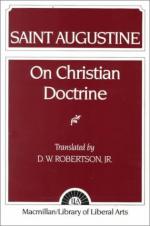
|
| Name: _________________________ | Period: ___________________ |
This test consists of 5 multiple choice questions and 5 short answer questions.
Multiple Choice Questions
1. What does Augustine state the student must do once the figurative and literal passages have been separated from each other?
(a) A second division needs to be made separating Old Testament from New Testament.
(b) The background of the passages needs to be compared.
(c) The meanings must be harmonized.
(d) The language and grammar must be checked for accuracy and similarities.
2. Based on the academic demands that Augustine places on his students, it is clear that Augustine believes what?
(a) That those who sought Augustine as a teacher will need to have conviction and determination to take on the challenges he puts before his students.
(b) That God is the master of all creation and language and the more you know of each the better you understand what God passed on in Scripture.
(c) That learning as much as possible is the best way to separate the individual from the common population.
(d) That personal discipline and focusing on things outside of the body helps build chastity and humility.
3. By making the demands of understanding Scripture difficult, who was Augustine criticizing?
(a) Those who believe that only studying the life of Christ was sufficient to understand Scripture.
(b) Those who believe that learning information outside of the Bible leads to heresy.
(c) Those who felt that Scripture could be interpreted through current events.
(d) His detractors believed Scripture could be interpreted easily through special gifts.
4. From what type of education does Augustine develop his curriculum of Scriptural learning?
(a) A Nazarene education.
(b) A classical education.
(c) An ecclesiastical education.
(d) A Hasidic education.
5. What is an apparent contradiction regarding Augustine's expectation of students to interpretation and an omission from his commentaries in "On Christian Doctrine"?
(a) Augustine expects his students to investigate the intentions of the authors of Scripture, but he does not detail his intentions in choosing the issues on which he focuses.
(b) Augustine writes that the understanding of the principles of Christian love are sufficient to begin the interpretation of Scripture, but he spends more time examining Old Testament law.
(c) Augustine criticizes the Donatists yet he uses their theology on which to base "On Christian Doctrine."
(d) Augustine demands his students to spend time in seclusion and study, but does not call for the same from teachers.
Short Answer Questions
1. What was the topic of Book Three?
2. What important understanding must the student of scripture possess, as stated in Book Two?
3. If Augustine sets a standard for how to interpret Scriptural characters literally, and he applies the converse of that standard for interpreting Scriptural character's figuratively, how would that standard be articulated?
4. Of the areas that Augustine emphasizes, what area receives the most intense focus?
5. What does Augustine call the types of grammar used through Scripture?
|
This section contains 670 words (approx. 3 pages at 300 words per page) |

|




